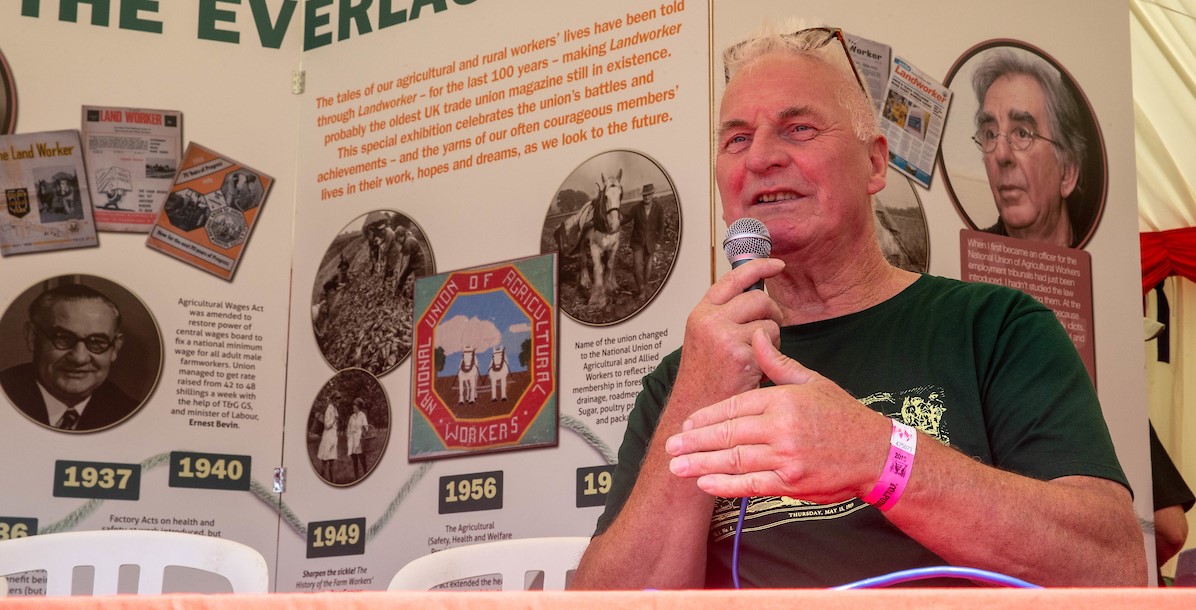‘I didn’t get help’
Protracted isolation, long hours and stressful work conditions have created a toxic mix that’s fuelling mental health problems among British farm workers.
A new BBC analysis of the latest figures has found that about one agricultural worker a week takes their own life across the UK.
Father and son Jonathan and Allan McCamley told the BBC this week of their own personal struggles with mental health following Allan’s divorce and a crash in the price of milk.
Allan recounted how at one point he considered taking his own life.
“I nearly did something stupid,” he said. “And the only thing that stopped me was the thought of Jonathan.
“I didn’t seek help – I didn’t get help. I just muddled and struggled through. I didn’t tell Jonathan what I’d done until a long time after it. I sort of seemed to be able to pull myself together a bit. And I hope I have pulled myself together.”
His son Jonathan, 22, highlighted the stigma surrounding mental health among farm workers.
“I think farmers in general feel, â€Well that’s your private life; you don’t want to be talking to your neighbours’,” he said. “When, really, talking to someone about it would lighten the load, even temporarily. I think it’s a good thing people talk.”
Stigma
Getting farmers to talk is the driving force behind the DPJ Foundation, founded by widow Emma Picton-Jones, whose farmworker husband took his own life in 2016.
Named after Emma’s late husband Daniel Picton-Jones, the foundation aims to support people in rural communities, specifically Pembrokeshire, with poor mental health, especially men in the agricultural sector.
The foundation helps farmworkers access mental health services such as counselling.
Hannah, a volunteer for the foundation, told the BBC that farm workers tend not to open up about mental health.
“They hold it in,” she said. “There’s a massive [mental health] stigma in agriculture.”
Failing to open up is something Unite member and mental health nurse Alex Cotton MBE knows all too well about.
Cotton founded the men’s mental health charity It Takes Balls to Talk, which uses sporting themes to encourage people, particularly men, to talk about their feelings and mental health problems. The campaign group trains volunteers who go to sporting events such as football and rugby matches to break down the barriers that men so often erect in caring for their own mental health — by simply listening.
Responding to the BBC’s latest investigation of farm workers’ mental health, she said she believes masculine self-identities may be even more deeply entrenched in agriculture than in wider society.
“Farm workers are steeped in very traditional cultures, where there is this male image of being the provider, of being the tough guy who doesn’t complain,” she said. “They are also isolated in their work which makes reaching out doubly difficult. Financial pressures endemic in farm work only add to the strain that can contribute to mental health problems.”
Cotton added that the suicide rate among agricultural workers may also be high because of access to guns.
“While suicidal thoughts may stem from depression and other chronic mental health conditions, the ultimate act of suicide is often an impulsive one. When you have easier access to guns and other tools that can inflict lethal harm as many farmers do, it’s a devastating but unsurprising fact that the suicide rate is high.”
Cotton believes that Unite and other farm workers’ unions have a pivotal role to play in improving mental health in the agricultural sector.
“Peer-to-peer support should be vital in any mental health initiatives to support farm workers. Because of the isolation and agricultural workers’ unique lifestyles, having support from others like you who experience the same pressures is important. Farm workers who have struggled with mental ill health and successfully sought help can act as role models to break that stigma. Farmers must understand that it’s not weak to seek help. Very much the opposite — it takes strength to reach out.”
Reinstate AWB call
Mental health problems in the agriculture sector were highlighted in a separate survey earlier this year from the Farm Safety Foundation, which found that a shocking four-fifths of farm workers under 40 said they believed poor mental health was the biggest issue facing the industry.
More than 90 per cent of farm workers surveyed said promoting good mental health in the industry was â€crucial’ to the sector’s future.
Unite national officer for food and agriculture Bev Clarkson said that the government has a vital role to play in doing just that.
She highlighted how both the abolishment of the Agricultural Wages Board (AWB) in England and continued Brexit uncertainty has added to the stress farm workers are under.
“Isolation and other conditions that go hand-in-hand with farm work certainly have a hand in mental health problems in the industry,” she said. “But we cannot overlook the massive impact policy changes can have on farm workers. Since the abolition of the AWB in England, agricultural workers have faced cuts to wages, and holiday and sick pay. Safety protections too have been slashed, as have accommodation standards. Instead of exacerbating the pressure that fuels mental health problems among farm workers, the government should do the right thing and reinstate the AWB.”
Turning to Brexit, Clarkson added, “Brexit uncertainty has already had a devastating impact on farming in the UK amid increasing labour shortages that last year saw fruit rotting, going unpicked. This has again added to the pressure farm workers are under, who already face long, arduous hours. The government is gambling with farmworkers’ health by failing to give the industry the certainty that it needs.”
Find out more about It Takes Balls to Talk and how you can get help here. Need to talk to someone now? Here’s a list of resources.
 Like
Like Follow
Follow


